Description
The primary vision of health psychology is to apply psychological applications, theory, methods and skills to prevent illness, facilitate recuperation and improve health and well-being. Its concerns include social conditions (such as the availability of health care), biological factors (such as family longevity and inherited vulnerabilities to certain disease), and even personality traits (such as optimism). Health and illness have long been the object of scientific and clinical interest for psychologists and medical professionals. The separation between ‘psychological’ on the one hand and ‘physical, medical or somatic’ on the other is quite superficial and unhelpful. Modern development in the area of psycho-neuro-immunology, for example or in the area of interrelationalship between genetic and behavioural factors in staying healthy or becoming ill, are just some illustrations of this statement.
This issue has a number of contribution that deal with psychological, physical and social dimensions of health. The first article in this issue by Srivastava and Krishna conceptualize the psycho- physiological mechanism between spirituality and health and stress on spirituality for enhancing health. They also discuss the effect of yoga and spirituality on metal health and physical health in Indian settings. Highlighting the issue of positive aspect of health, Singh and Pareek, articulate positive thinking, love, social support, purpose in life, optimism, self esteem, spirituality and eating right food as the health enhancing factors. Radhey Shyam and Renu pay attention on psychological factors as modulators of human immune function. They argue that knowledge and understanding the immunomodulatory factors are important to improve the health. Srivastava et al., reviewed psycho-social factors in preterm delivery and low birth weight. They suggest clinical intervention programs to reduce the occurrence/incidence of preterm delivery and low birth weight.
In the second section, Broota el al. investigated adolescent depression in the light of parental depression and examined the co-morbidity of depression with anxiety and anger. They observed a positive relationship between severity of depression in female adolescents and parental depression. The subjects high on depression had parents with depression, in comparison to the subjects who were low on depression. Shrivastava and Mishra find a positive correlation between social support and psychological well-being university male teachers. On the issue of well-being, Kakkar and Shukla draw attention to the employment level, sex and age found that magnitude of well-being was varied with variation in the level of employment, age and gender. Gupta and Sharma investigate the physiological relaxing effects of counseling in HIV Positive patients. They found that counseling reduce blood pressure, pulse rate, muscle action potential and increase alpha EEG scores. Thingujam investigate relationship of anger and self esteem, and found that higher anger control was correlated with higher self esteem in female group. In the young people, higher avoidance anger coping style tended to correlate with higher self esteem. Menon et al., investigate the correlation between mental health and intelligence of sport persons and notice a positive correlation among different dimensions of mental health and intelligence. Kaushik and her associates have reported that female employees have more organizational role stress in comparison to male employees however, reducing trend with, increasing experience. In the short communication section, Kumar and Mohanty highlight the psychological management of chronic pain and suggest cognitive behaviour therapy, biofeedback, relaxation and hypnosis as the effective techniques in the pain management.
This issue also includes review of recent three recent books. Editors express thanks to the article and book reviewers contributors. Hope, this issue of Journal will inspire and generate interest among researcher, educationist, psychologist, policy maker and health professionals to understand the health psychology. We seek the feedback of readers to make the journal a more effective vehicle in the field of health psychology.
Contents
| Editorial | iii | |
| Articles | ||
| 1 | Psycho-Physiological Mechanism of Spirituality-Health Relationship: Theoretical Conceptualisation | 1 |
| A. K. Srivastava and A. Krishna | ||
| 2 | Positive Predictors of Health | 10 |
| Shyodan Singh and Rekha Pareek | ||
| 3 | Psychosocial Factors as Modulators of Human Immune Function: An Appraisal | 20 |
| Radhey Shyam and Renu | ||
| 4 | Role of Psycho-Social Factors in Preterm Delivery and Low Birth Weight: A Critical Review1 | 35 |
| Urmila R. Srivastava, Manjari Singh and Madhu Jain | ||
| Research Articles | ||
| 5 | Understanding Adolescent Depression | 52 |
| Aruna Broota, Shohag Dey and Rupinder Kaur | ||
| 6 | Social Support and Psychological Well-being among University Male Teachers | 67 |
| Monika Srivastava and P.C. Mishra | ||
| 7 | Well Being in Kumaun as Affected by Employment Level, Sex and Age: A Developmental Analysis | 73 |
| Ruchi Kakkar and Aradhana Shukla | ||
| 8 | Physiological Relaxing Effects of Counselling in HIV Positive Patients | 87 |
| Sunita Gupta and Meenakshi Sharma | ||
| 9 | Coping with Anger and Self-esteem Across Gender and Age Groups | 94 |
| Nutankumar S. Thingujam | ||
| 10 | Mental Health and Intelligence of Sportspersons | 107 |
| Rajitha Menon. A., Santhosh. A.M. and C. Jayan | ||
| 11 | A Comparative Study of Organisational Role Stress among Bank Employees | 115 |
| Nirmala Kaushik, Joginder Kairo and Jyotsana | ||
| Short communication | ||
| 12 | Psychological Management of Chronic Pain | 121 |
| S. Kumar and S. Mohanty | ||
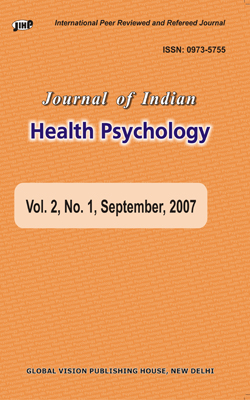
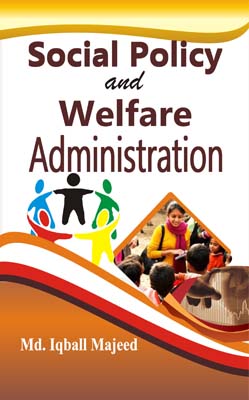
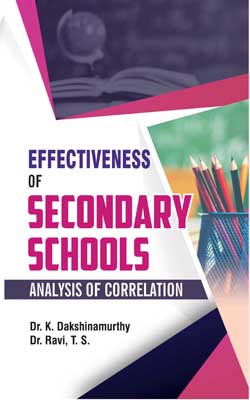




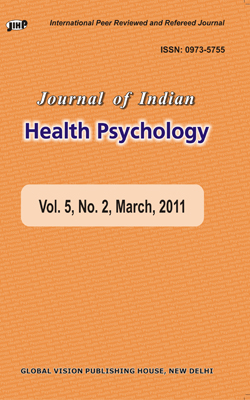
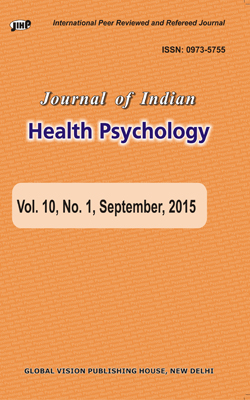
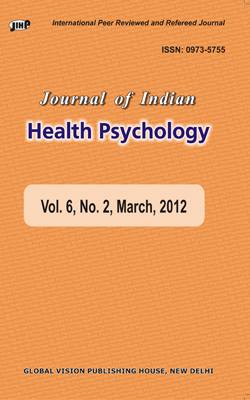
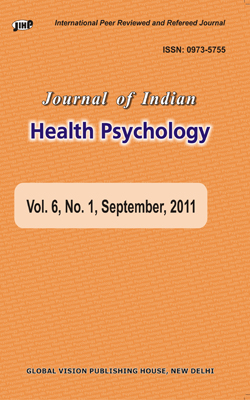
Reviews
There are no reviews yet.